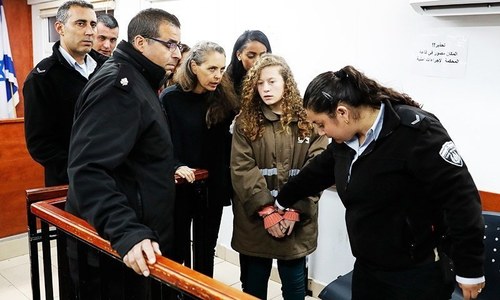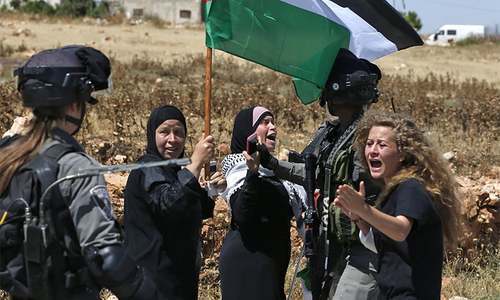Palestinian teenage protest icon Ahed Tamimi on Wednesday was sentenced to eight months in prison for slapping and kicking a pair of Israeli soldiers outside her West Bank home, capping a case that sparked uproar in Israel, turned the 17-year-old girl into a Palestinian hero, and attracted international attention.
Tamimi's Israeli lawyer, Gaby Lasky, said Tamimi agreed to the sentence as part of a plea deal with prosecutors that allowed her to avoid more serious charges that could have imprisoned her for years.
Under the deal, she is due to be released in the summer. She is also being fined the equivalent of about $1,400.
Lasky called the legal proceedings a "farce". She said "they are trying to deter other Palestinian youth from resisting occupation as Ahed did."
The judge agreed to a similar plea deal for Tamimi's mother Nariman, who has been charged with incitement.
"This is injustice, this court is designed to oppress the Palestinians," her father Bassem said. He said they agreed to the deal because they had been threatened with three years in jail.
Bassem had visited his daughter and wife for the first time in prison the day before. He said Ahed spends her time doing school work.
An Israeli supporter of Tamimi slapped a prosecutor after the ruling and was later arrested by police.
Tamimi was arrested in December after video surfaced of her kicking the soldiers outside her West Bank home.
While some praised the soldiers for showing restraint, hardline politicians criticised what they felt was a weak response and called for tough action against the girl, whose family has a long history of run-ins with the Israelis.
But the full-throttle prosecution of Tamimi, who turned 17 behind bars, has drawn widespread international criticism.
An Israeli official's revelation that he had once had parliament investigate whether the blond, blue-eyed Tamimis are "real" Palestinians drew accusations of racism and helped stoke additional interest in the case.
The case touches on what constitutes legitimate resistance to Israel's rule over millions of Palestinians, now in its 51st year, in territories it captured in the 1967 war.
"No justice under occupation and we are in an illegal court," Tamimi said to reporters in court.
Ahed Tamimi's supporters see a brave girl who struck the soldiers in anger after having just learned that Israeli troops seriously wounded a 15-year-old cousin, shooting him in the head from close range with a rubber bullet during nearby stone-throwing clashes.
In Israel, she is seen either as a naive youth manipulated by her elders or a threat to Israel's military deterrence. The incident also sparked debate about the soldiers' refusal to act.
Israel has treated Tamimi's actions as a criminal offense, indicting her on charges of assault and incitement that carry up to 14 years in prison.
Since 2009, residents of Tamimi's village of Nabi Salah have staged regular anti-occupation protests that often end with stone-throwing clashes.
Ahed Tamimi has participated in such marches from a young age, and has had several highly publicised run-ins with soldiers.
One photo shows the then-12-year-old raising a clenched fist toward a soldier towering over her.
Following her latest arrest, images of the girl became popular on posters in the West Bank. Some 1.7 million people worldwide have signed a petition calling for her release.
The case has drawn attention to Israel's military court system, which is used to try Palestinians in the West Bank. Israeli West Bank settlers, on the other hand, are tried under Israeli civilian courts.
The duelling justice systems have drawn criticism from international rights groups.
The military courts have a near 100 per cent conviction rate, in part because so many Palestinians agree to plea bargains. Critics say the system gives Palestinians few rights, and they are often coerced into plea deals.
Hundreds of Palestinian minors are processed by the military court system each year.
"Ahed will be home in a few months, but Israel is putting this child behind bars for eight months for calling for protests and slapping a soldier, after threatening her with years in jail," said Human Rights Watch Middle East Director Sarah Leah Whitson.
















































